Baghdad, Iraq
One of these photographs is of the telecommunications tower in Baghdad, taken from my room in the Al Rasheed Hotel. The hotel gained fame during the 1990-1991 Persian Gulf War when CNN conducted their newscasts from the hotel, propelling the network’s senior war correspondent Peter Arnett to the apex of journalism fame. Between the Persian Gulf War and the 2003 invasion of Iraq, the building was the main housing facility for Western businessmen and diplomats, as well as the foreign press.
After the invasion, the hotel was converted into a base for the Coalition and the American military. On October 26, 2003, twenty-eight 68 mm and 85 mm Katyusha rockets were fired at and struck the hotel, killing Lieutenant Colonel Charles H. Buehring and injuring 17 others. An additional 12 rockets failed to fire and remained in their tubes in the improvised launcher, which was located less than 250 meters from the hotel. Deputy Defense Secretary Paul Wolfowitz was staying in the hotel the night of the attack but was unhurt.
This was my first trip to Baghdad and once again was following my grandfather’s footsteps. Our journeys were separated by nearly 100 years, two world wars, an Iran-Iraq war and the two most recent Gulf wars. He had been there as a doctor in the Mesopotamian campaign which liberated Baghdad from the Ottoman Empire.
Travelling as a member of an Iraq Britain Business Council (IBBC) Trade Mission led by Baroness Emma Nicholson, my visits have helped promote British interests in a country pulling itself to its feet after too many years of conflict.
The IBBC is an organisation which facilitates business, trade investment, human resources, training and transfer of technology and know-how into the Republic of Iraq. It seeks to bring together Iraqi, British and international companies and public sector bodies by giving them a joint platform and identifying their mutual interests and common goals. It is aimed to be a powerful network of the most important Iraqi, British and international business organisations, which enjoys high-level support from both Governments and the EU.
For my visit, I found a dusty, perhaps faded hotel with most of the ground floor windows shattered by the bomb blast of the previous week. The glass was held in place by the plastic blast film that had clearly done its job. My room was functional on the whole, although the rusty water that trickled out of the shower was cool enough to wake me up in the morning. Security was partly provided by the Iraqi government and partly by Pilgrims, a private security firm.
The short visit flashed by with a series of audiences with senior government ministers and with representatives of the Baghdad business community. On the last day, my PSD took me and a colleague to the site of the Swords of Victory. The swords stand at either end of a wide avenue along which Saddam Hussein’s troops once paraded. Now it is deserted, and its fate is hanging in the balance.
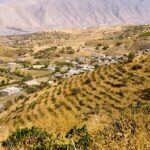
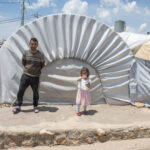
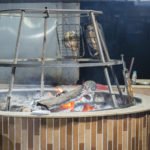
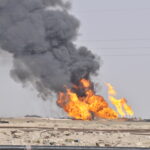
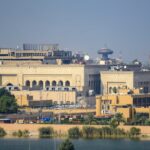
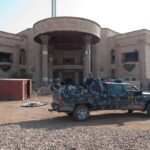
Leave a comment